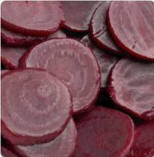Beet root and cancer
BeetRoot health benefits Beetroot contains folate, potassium and manganese. The green leafy tops
are especially
nutritious as they contain calcium, beta-carotene and iron.
Experts believe that the red pigmentation of beetroot Experts believe that the red pigmentation of beetroot contains
certain anti-cancer agents and beetroot has been used in the
treatment of cancer for some years.

Beetroot has for many years been used as a treatment for cancer in Europe. Specific anti-carcinogens are bound to the red colouring matter which helps fight against cancer and beetroot also increases the uptake of oxygen by as much as 400 percent. Additional studies are taking place to add support to these claims. The green leafy part of the beetroot is also of nutritional value containing beta-carotene and other carotenoids,( Carotenoid refers to plant pigments - of which there is a family of about 600 different types. These all function as antioxidants. The yellow, orange, and many of the red pigments in fruits, vegetables, and plant materials are usually carotenoids.) This part of the beet also contains lots of folate, iron, potassium and some vitamin C. The roots and greens therefore are great for women in general and for those planning pregnancy.
Try eating the leaves and stalk boiled or steam and
accompany with other more flavorsome vegies like onions and garlic.
Or chop finely and add to quiches or stir-fries
A study in the US journal Hypertension found that blood pressure was reduced within 24 hours in people who drank beetroot juice or took nitrate tablets.
The higher the blood pressure, the greater the impact of the nitrates.
This research suggests there is hope of using a more "natural" approach to bring down blood pressure. Nitrates are found in a number of vegetables.
A previous study found that drinking a pint of beetroot juice lowered blood pressure significantly in people with normal blood pressure.
Amrita Ahluwalia, author of the study and professor of vascular pharmacology at Barts and the London School of Medicine and Dentistry said they had now proved why.
"We showed that beetroot and nitrate capsules are equally effective in lowering blood pressure, indicating that it is the nitrate content of beetroot juice that underlies its potential to reduce blood pressure," she said.
The research shows that the inorganic nitrate content in beetroot is changed into the gas nitric oxide when eaten. This gas keeps the blood vessels open and relaxed and keeps blood pressure down.
World problemCardiovascular disease kills over 110,000 people in England every year.
More than 25% of the world's adult population is hypertensive, and it has been estimated that this figure will increase to 30% by 2025.
Eating fruit and vegetables is known to be good for our cardiovascular health.
But researchers say green, leafy vegetables like lettuce and beetroot are best at reducing the risk of strokes and heart attacks because of their high inorganic content, which comes from nitrates in the soil.
"The hope is that we could take a dietary nitrate approach and advise people to eat vegetables with high nitrate content," said Professor Ahluwalia.
Victoria Taylor, senior dietician at the British Heart Foundation, which funded the study said: "Although beetroot was used in this study it seems that the important thing here is the nitrates.
"More research is now needed to confirm these findings and to identify if the same effect is seen with other vegetables.
"The study seems to add more weight to the fact that we need to eat at least five portions of fruit and vegetables each day," she said.
The study also found that men and women reacted differently to beetroot juice.